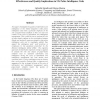Free Online Productivity Tools
i2Speak
i2Symbol
i2OCR
iTex2Img
iWeb2Print
iWeb2Shot
i2Type
iPdf2Split
iPdf2Merge
i2Bopomofo
i2Arabic
i2Style
i2Image
i2PDF
iLatex2Rtf
Sci2ools
JCIT
2007
2007
A Paper-Centred Information System: Effectiveness and Quality Implications in UK Police Intelligence Units
This paper investigates the quality of information and intelligence in the United Kingdom’s (UK) police intelligence units with a particular emphasis on the role of paper-based artefacts as they are used and created in the cycle of information and intelligence management. This is with the aim to analyse the role of paper-based artefacts in the coordination between human and technical resources adopted in the police intelligence units and to investigate whether they support the intelligence units’ work practices in compliance to the guidelines prescribed by the National Intelligence Model (NIM). The cognitive approach of Distributed Cognition (DCog) is applied to analyse the role and impact of paper-based artefacts used to represent information and intelligence during the cycle of information and intelligence management and case studies were conducted with 15 police intelligence units to observe their work practices. Findings offer a diagnosis and suggestion for the re-design of pa...
| Added | 15 Dec 2010 |
| Updated | 15 Dec 2010 |
| Type | Journal |
| Year | 2007 |
| Where | JCIT |
| Authors | Gabriella Spinelli, Bhavna Sharma |
Comments (0)

